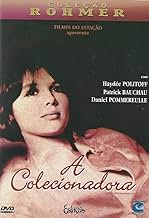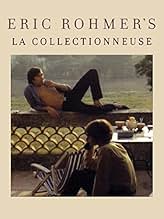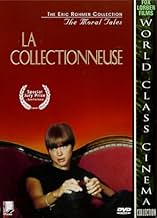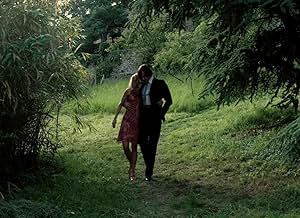La collectionneuse
- 1967
- Tous publics
- 1h 26m
IMDb RATING
7.3/10
10K
YOUR RATING
A womanizing art dealer and a painter find the serenity of their Riviera vacation disturbed by a third guest, a vivacious bohemian woman known for her long list of male conquests.A womanizing art dealer and a painter find the serenity of their Riviera vacation disturbed by a third guest, a vivacious bohemian woman known for her long list of male conquests.A womanizing art dealer and a painter find the serenity of their Riviera vacation disturbed by a third guest, a vivacious bohemian woman known for her long list of male conquests.
- Awards
- 2 wins & 1 nomination total
Mijanou Bardot
- Carole
- (as Mijanou)
Eugene Archer
- Sam
- (uncredited)
Brian Belshaw
- Haydée's boyfriend
- (uncredited)
Pierre-Richard Bré
- Homme dans l'auto
- (uncredited)
Donald Cammell
- Garçon à St-Tropez
- (uncredited)
Alfred de Graff
- Touriste perdu
- (uncredited)
Featured reviews
In The Collector, the first feature-length film of the Six Moral Tales series, mind-games, strategies, and overt manipulation thwart the possibility of satisfying relationships. The 54-minute film is beautifully photographed and has an elegance, charm, and wit that bears favorable comparison with his more acclaimed works. Adrien (Patrick Bauchau), an art dealer, and Daniel (Daniel Pommereulle), a painter spend the summer in a house on the French Riviera. Also vacationing there is Haydee (Haydee Politoff), an elegant but rather aloof young woman who sleeps with many boys in the area and has earned the title of "collectionneuse", a collector of men. Adrien, smug and self-centered in a charming sort of way, is interested in Haydee but tells himself that her promiscuity is a trick for him to seduce her and he refuses.
The summer turns into a love triangle with Adrien convincing Daniel to pursue Haydee to ease the pressure of his own conflict between his rationalizing intellect and his passions. In the moral scheme of things, Haydee may represent the sexual revolution of the 60s and Adrien that of traditional morality, yet the film takes no sides, presenting the issues without judging the characters and giving us much to think about. The Collector is perhaps the most philosophical of the six but in the end the pursuit without passion leads to a feeling of emptiness and missed opportunities. Like most of Rohmer's films, there are no peak dramatic moments or confrontations, just everyday life elevated into art.
The summer turns into a love triangle with Adrien convincing Daniel to pursue Haydee to ease the pressure of his own conflict between his rationalizing intellect and his passions. In the moral scheme of things, Haydee may represent the sexual revolution of the 60s and Adrien that of traditional morality, yet the film takes no sides, presenting the issues without judging the characters and giving us much to think about. The Collector is perhaps the most philosophical of the six but in the end the pursuit without passion leads to a feeling of emptiness and missed opportunities. Like most of Rohmer's films, there are no peak dramatic moments or confrontations, just everyday life elevated into art.
The first feature length moral tale, La Collectionneuse is easily better than its predecessors. Offering a realistic look into the lives of three young people and narrated perfectly by one, La Collectionneuse is a beautiful film. This is Eric Rohmer's first color feature and it is absolutely magnificent to look at. There are several gorgeous beach scenes. The cinematography all around is just glorious. Aside from that, the acting is wonderful. There is so much chemistry between the main characters that it electrifies the film. It also provides a realistic tale of the struggle to keep morality. Translated as "The Collector" in English, La Collectionneuse is an overlooked, underrated film that should be considered a classic.
The story begins with three prologues. The first, Haydee's prologue, simply shows the girl on the beach in a skimpy bikini. The second prologue introduces the viewer to Daniel, a painter, who becomes a key character. Adrien's prologue, the third and last, gives us an introduction to Adrien, who becomes our narrator throughout the rest of the film. These three characters are whom the story revolves around. Sharing a mutual friend, the three of them come to share a villa during their vacation. Adrien, an art dealer who is played by Patrick Bauchau, has made it his goal to do absolutely nothing during his stay. He and Daniel (Daniel Pommereulle) become friends fairly quickly, but both keep their distance from Haydee (Haydee Politoff), the beautiful young girl who beds a different guy every night. Adrien is at first disgusted with her behavior, calling her a "collector" of men, but eventually becomes intrigued by her. As he grows more and more attracted to her, Adrien must decide whether or not to sleep with her and forget his moral integrity or to abstain and do what he knows is right. Through his narration, Adrien debates this and plays mind games with Haydee, although he's not sure if she shares the attraction or if she simply wants to add him to her collection.
This film is simply beautiful. The sexual tension feels very real, which is due to both the performances of the actors and the direction of Eric Rohmer, who is quickly becoming one of my favorite directors. The narration is refreshing, offering a good look into Adrien's mind. La Collectionneuse is very sharp with its dialogue and themes. Like the other Rohmer films I've seen, this one ends very abruptly. It reminds us that we're watching these people's lives for only a short time. The 87 minutes is completely worth it, though. La Collectionneuse is a great film and should be regarded in higher esteem than it seems to be. I can't imagine why this one isn't ranked alongside the greats.
10/10
The story begins with three prologues. The first, Haydee's prologue, simply shows the girl on the beach in a skimpy bikini. The second prologue introduces the viewer to Daniel, a painter, who becomes a key character. Adrien's prologue, the third and last, gives us an introduction to Adrien, who becomes our narrator throughout the rest of the film. These three characters are whom the story revolves around. Sharing a mutual friend, the three of them come to share a villa during their vacation. Adrien, an art dealer who is played by Patrick Bauchau, has made it his goal to do absolutely nothing during his stay. He and Daniel (Daniel Pommereulle) become friends fairly quickly, but both keep their distance from Haydee (Haydee Politoff), the beautiful young girl who beds a different guy every night. Adrien is at first disgusted with her behavior, calling her a "collector" of men, but eventually becomes intrigued by her. As he grows more and more attracted to her, Adrien must decide whether or not to sleep with her and forget his moral integrity or to abstain and do what he knows is right. Through his narration, Adrien debates this and plays mind games with Haydee, although he's not sure if she shares the attraction or if she simply wants to add him to her collection.
This film is simply beautiful. The sexual tension feels very real, which is due to both the performances of the actors and the direction of Eric Rohmer, who is quickly becoming one of my favorite directors. The narration is refreshing, offering a good look into Adrien's mind. La Collectionneuse is very sharp with its dialogue and themes. Like the other Rohmer films I've seen, this one ends very abruptly. It reminds us that we're watching these people's lives for only a short time. The 87 minutes is completely worth it, though. La Collectionneuse is a great film and should be regarded in higher esteem than it seems to be. I can't imagine why this one isn't ranked alongside the greats.
10/10
10totius
It's hard to explain what is the Rohmer's cinema. In his movies you can't find heroes, incredible adventures or great action sequences. Everything happens inside the mind of the characters, and the most important aspect is the psychology of them.
La Collectioneuse is simply the masterpiece of Rohmer.
The plot is very simple: two boys and one girl in their friend's house in St.Tropez. That's all. There are not incredible events that happen, they simply LIVE there. It's an typical situation of Rohmer who likes to study the evolution of love triangles, in different situations. The explanation of the development steps, made by the usual interior voice of the main character (Adrien), it's incredibly accurate and likely. It's fantastic that sometimes Adrien's thoughts look at first to be absurd, but even in this case if we reflect a bit to that we can realize that it's true, that really in similar cases we have non-sense thoughts like those. In this way, Rohmer is unique: the psycho-evolution of the characters is incredibly real. Dialogs, internal and not, are superb and the directing essential.
Rohmer shows us how it's possible to make a masterpiece with a ridiculous budget, and how an intellectual movie can be also enjoyable and not so heavy.
The vote, of course, can't be different by 10 out of 10.
La Collectioneuse is simply the masterpiece of Rohmer.
The plot is very simple: two boys and one girl in their friend's house in St.Tropez. That's all. There are not incredible events that happen, they simply LIVE there. It's an typical situation of Rohmer who likes to study the evolution of love triangles, in different situations. The explanation of the development steps, made by the usual interior voice of the main character (Adrien), it's incredibly accurate and likely. It's fantastic that sometimes Adrien's thoughts look at first to be absurd, but even in this case if we reflect a bit to that we can realize that it's true, that really in similar cases we have non-sense thoughts like those. In this way, Rohmer is unique: the psycho-evolution of the characters is incredibly real. Dialogs, internal and not, are superb and the directing essential.
Rohmer shows us how it's possible to make a masterpiece with a ridiculous budget, and how an intellectual movie can be also enjoyable and not so heavy.
The vote, of course, can't be different by 10 out of 10.
"La Collectionneuse", the third film in Eric Rohmer's six moral tales, is packed with lacerating observations on life, love, and the nature of man. It is a sensitive conversation piece with elegant people commenting poetically on their lives and of those around them. Attractive men and women who reflect openly about the conflicts of intellect and impulse; inclination and action, solitude and companionship. Rohmer characteristically paces this eloquent tale of sexual temptation with long, fluid takes. "La Collectionneuse(Collector Girl) centers around a young, hedonistic girl(Haydee) who saunters laconically around the provincial environs of a large vacation home, seemingly indifferent to the two older men's(Adrian and Danele) existence. Haydee exudes a casual independence and an unflappable reserve. Her cursory dealings with her young lovers prompts Danele to cast her as 'the atrocious ingenue'. Though they find her unexpectedly alluring, both men regard 'the idea of collecting boyfriends opposite of purity'. Rohmer, the director of "Chloe in the Afternoon" and "A Tale of Springtime", enjoys revealing which individual can best cast their charm and guile to their best advantage. This 'game' between the sexes only leads to unwanted desires for the men and a resumption of her search by Haydee. Rohmer handles the material with a light touch throughout and concludes his story by offering a tenuous solution to the prevailing tension in the movie between one's solitude and fraternity. Adrian privately confesses that 'I was overwhelmed by a feeling of delightful independence, of total self-determination. But in the emptiness and silence of the house, I was overcome with anguish'. A universal truth clearly-rendered by one of cinema's most ingenious and graceful filmmakers.
Two tired cliches are that sex destroys friendships and that men and women can never really be friends and no-one chronicled these two sayings better than Eric Rohmer who made it his life's work to explore the psychological battles that we call courtship. In doing so he became, perhaps, the cinema's greatest director of women. Let's forget for a moment that he divided his films into series, (Six Moral Tales, for example, of which "La Collectionneuse" is one), and concentrate on the film at hand.
"La Collectionneuse" is very simple and very straightforward. Two male friends spend a summer sharing a villa in the south of France. There is another occupant, a slightly younger woman who sleeps around and it is she the men christen the collector since she 'collects' men wherever she goes. They, of course, consider themselves moral but they are also intellectuals and perhaps womanisers, too. They want to collect the girl; they want the girl to collect them.
Like all of Rohmer's best work this is a film of talk rather than action. Rohmer doesn't film love scenes or sex scenes; once his male and female characters enter the bedroom he loses interest. It's the chase and not the catch he cares about and whether men and women really can be friends as well as lovers. He takes his subjects seriously but he also likes to have fun at their expense and like so many of his films "La Collectionneuse" will have you chuckling if not exactly laughing out loud.
In his later films it was usually the women who took the lead but here it is Adrien, (a superb Patrick Bauchau), who acts as our narrator, guiding us through the moral maze but then all three players are excellent. This may be a minor Rohmer film but minor only in the way a short story is considered minor when compared to a novel. Personally I think "La Collectionneuse" is a Rohmer crying out for your collection.
"La Collectionneuse" is very simple and very straightforward. Two male friends spend a summer sharing a villa in the south of France. There is another occupant, a slightly younger woman who sleeps around and it is she the men christen the collector since she 'collects' men wherever she goes. They, of course, consider themselves moral but they are also intellectuals and perhaps womanisers, too. They want to collect the girl; they want the girl to collect them.
Like all of Rohmer's best work this is a film of talk rather than action. Rohmer doesn't film love scenes or sex scenes; once his male and female characters enter the bedroom he loses interest. It's the chase and not the catch he cares about and whether men and women really can be friends as well as lovers. He takes his subjects seriously but he also likes to have fun at their expense and like so many of his films "La Collectionneuse" will have you chuckling if not exactly laughing out loud.
In his later films it was usually the women who took the lead but here it is Adrien, (a superb Patrick Bauchau), who acts as our narrator, guiding us through the moral maze but then all three players are excellent. This may be a minor Rohmer film but minor only in the way a short story is considered minor when compared to a novel. Personally I think "La Collectionneuse" is a Rohmer crying out for your collection.
Did you know
- TriviaÉric Rohmer's first color film.
- ConnectionsFeatured in Uuden aallon jäljillä (2009)
Details
- Release date
- Country of origin
- Official site
- Languages
- Also known as
- Six contes moraux IV: La Collectionneuse
- Filming locations
- Côte d'Azur, France(coastal line and landscapes)
- Production companies
- See more company credits at IMDbPro
Box office
- Gross worldwide
- $7,077
- Runtime
- 1h 26m(86 min)
- Sound mix
- Aspect ratio
- 1.37 : 1
Contribute to this page
Suggest an edit or add missing content

![Watch Bande-annonce [OV]](https://m.media-amazon.com/images/M/MV5BMjA2ZGRjY2QtNmMzMy00MjE3LWI1YzUtZTZiZDQ5YzY0YWIxXkEyXkFqcGdeQXRyYW5zY29kZS13b3JrZmxvdw@@._V1_QL75_UX500_CR0)

























